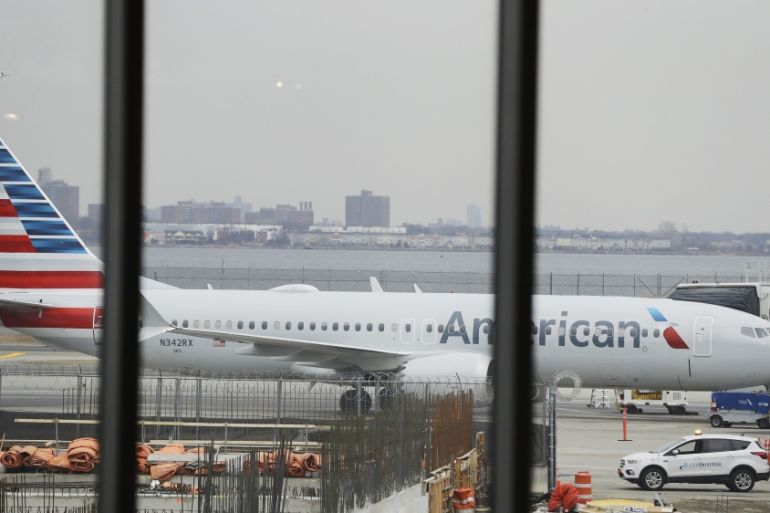Boeing unveils fix to flight system after deadly crashes
Move announced as US aviation regulator faces harsh questions about a ‘too-cozy’ relationship with plane manufacturer.

Embattled aviation giant Boeing pledged to do all it could to prevent crashes such as the two that killed nearly 350 people in recent months as it unveiled a fix to the flight software of its grounded 737 Max aircraft.
Boeing gathered hundreds of pilots and reporters to unveil the changes to a stall-prevention system, which has been implicated in the crashes in Ethiopia and Indonesia, as part of a charm offensive to restore the company’s reputation.
Keep reading
list of 4 itemsMore than 11,000 evacuated in northern Indonesia as volcano erupts
Jordan, Lebanon, Iraq reopen airspace closed over Iran’s attacks on Israel
Australian women lose bid to sue Qatar Airways over 2020 strip searches
“We are going to do everything to make sure that accidents like this don’t happen again,” Mike Sinnett, Boeing’s vice president of product strategy, told reporters at a factory in Washington state.
Meanwhile, in the nation’s capital, the head of the United States‘s air safety agency faced harsh questions from senators over its relationship with and oversight of Boeing.
Senator Richard Blumenthal said at a Senate subcommittee hearing the Federal Aviation Administration’s (FAA) delegating safety work to aviation companies puts “the fox in charge of the henhouse”.
“The fact is that the FAA decided to do safety on the cheap, which is neither safe nor cheap,” Blumenthal said. He vowed to introduce legislation to change the system.
Dan Elwell, the acting head of the FAA, defended his agency but acknowledged that, as systems become more complex, its “oversight approach needs to evolve”.
|
|
Ahead of the tough questioning, Boeing launched a campaign to convince the flying public that it is addressing the issues with the 737 Max, including a fix to the Maneuvering Characteristics Augmentation System (MCAS) implicated in the deadly crashes.
Boeing unveiled the software changes – which Sinnett said were developed “after months of testing and hundreds of hours” – at the company’s massive factory in Renton, Washington, and offered reassurances.
Authorisation pending
The MCAS, which lowers the aircraft’s nose if it detects a stall or loss of airspeed, was developed specifically for the 737 Max, which has heavier engines than its predecessor.
Among the changes, the MCAS will no longer repeatedly make corrections when the pilot tries to regain control, and will automatically disconnect in the event of disagreements between the two “angle-of-attack” (AOA) sensors, the company said.
The initial investigation into the October Lion Air crash in Indonesia, which killed all 189 people on board, found one of the AOA sensors failed but continued to transmit erroneous information to the MCAS.
Boeing also will install a warning feature – at no cost – called a “disagree light” to indicate to the pilot when the left and right AOA sensors are out of sync.
The company also is revising pilot training, including for those already certified on the 737, to provide “enhanced understanding of the 737 Max” flight system and crew procedures.
US pilots complained after the Lion Air crash that they had not been fully briefed on the system.
Members of the Allied Pilots Association were among the 200 airline customers and others who spent the day at Boeing getting details.
“With the software enhancements, we now have several layers of protection,” American Airlines Captain Roddy Guthrie told reporters.
‘The gold standard‘
But despite the revisions, in Washington, DC, Elwell seemed to cast doubt on the MCAS as the culprit, saying data collected from 57,000 flights in the US since the Max was introduced in 2017 showed not a single report of an MCAS malfunction.
|
|
And the kind of flaw it could create is something “pilots are trained from day one” how to handle, he said.
Elwell faced questions about how certification for the Max was handled and why he did not immediately ground the aircraft after an Ethiopian Airlines 737 Max 8 crashed shortly after takeoff near Addis Ababa on March 10, killing all 157 people onboard.
The delay has given rise to suspicions of an excessively cosy relationship between regulators and the US aircraft manufacturer.
Elwell said the FAA is “the gold standard” for aviation safety around the globe, and denied the agency was lax in reviews of the new systems in the Max, even though certification of some elements, including the MCAS, were eventually delegated to Boeing.